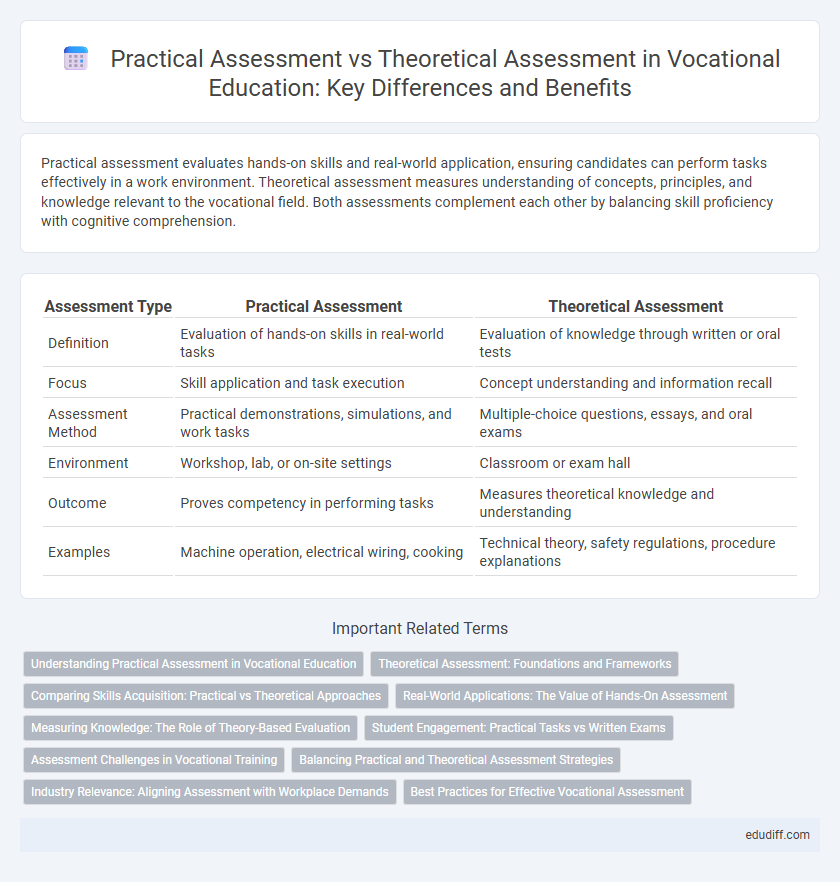Practical assessment evaluates hands-on skills and real-world application, ensuring candidates can perform tasks effectively in a work environment. Theoretical assessment measures understanding of concepts, principles, and knowledge relevant to the vocational field. Both assessments complement each other by balancing skill proficiency with cognitive comprehension.
Table of Comparison
| Assessment Type | Practical Assessment | Theoretical Assessment |
|---|---|---|
| Definition | Evaluation of hands-on skills in real-world tasks | Evaluation of knowledge through written or oral tests |
| Focus | Skill application and task execution | Concept understanding and information recall |
| Assessment Method | Practical demonstrations, simulations, and work tasks | Multiple-choice questions, essays, and oral exams |
| Environment | Workshop, lab, or on-site settings | Classroom or exam hall |
| Outcome | Proves competency in performing tasks | Measures theoretical knowledge and understanding |
| Examples | Machine operation, electrical wiring, cooking | Technical theory, safety regulations, procedure explanations |
Understanding Practical Assessment in Vocational Education
Practical assessment in vocational education emphasizes hands-on skills and real-world application, enabling students to demonstrate competency in their specific trade or profession. It involves tasks such as simulations, on-the-job performance, and skill demonstrations that directly reflect workplace requirements. This form of evaluation ensures learners can apply theoretical knowledge effectively in practical environments, bridging the gap between classroom learning and industry expectations.
Theoretical Assessment: Foundations and Frameworks
Theoretical assessment in vocational education establishes the foundational knowledge and conceptual frameworks critical for skill acquisition and application. It evaluates a learner's understanding of principles, regulations, and methodologies underpinning practical competencies. This form of assessment ensures mastery of essential theories that support informed decision-making and problem-solving in vocational contexts.
Comparing Skills Acquisition: Practical vs Theoretical Approaches
Practical assessment in vocational training emphasizes hands-on experience, enabling learners to acquire and demonstrate skills directly related to job performance. Theoretical assessment focuses on understanding concepts and principles, which supports knowledge retention but may not fully capture competency in real-world tasks. Combining both approaches ensures comprehensive skills acquisition by addressing knowledge application and practical execution.
Real-World Applications: The Value of Hands-On Assessment
Hands-on assessments in vocational training enhance skill acquisition by simulating real-world tasks, ensuring learners can apply theoretical knowledge effectively in practical settings. These assessments provide measurable evidence of competency, improving job readiness and employer confidence. Incorporating practical evaluations bridges the gap between classroom learning and workplace demands, fostering career success.
Measuring Knowledge: The Role of Theory-Based Evaluation
Theory-based evaluation plays a crucial role in measuring knowledge by assessing a learner's understanding of concepts, principles, and information essential to vocational skills. Unlike practical assessment, which evaluates the application of skills in real-world scenarios, theoretical assessment focuses on cognitive comprehension through written exams, quizzes, and oral tests. This method ensures that foundational knowledge is solid before advancing to hands-on tasks, enhancing overall competency in vocational training programs.
Student Engagement: Practical Tasks vs Written Exams
Practical assessments significantly increase student engagement by allowing hands-on tasks that directly apply vocational skills, fostering deeper understanding and retention. Written exams, while valuable for testing theoretical knowledge, often result in lower motivation due to their abstract nature and limited real-world application. Vocational students demonstrate higher performance and enthusiasm through active participation in practical tasks compared to traditional written assessments.
Assessment Challenges in Vocational Training
Practical assessment in vocational training often encounters challenges such as limited access to real-world equipment and varying skill demonstration environments, which can affect the consistency and reliability of evaluation. Theoretical assessments face difficulties like ensuring test validity and addressing diverse learner backgrounds, potentially impacting knowledge retention and comprehension accuracy. Balancing these challenges requires integrating authentic performance-based tasks with standardized theoretical evaluations to accurately measure competency in vocational education.
Balancing Practical and Theoretical Assessment Strategies
Balancing practical and theoretical assessment strategies in vocational education ensures comprehensive skill evaluation and knowledge retention. Practical assessments like hands-on tasks and simulations accurately measure applied competencies, while theoretical assessments such as exams and quizzes test foundational understanding. Integrating both approaches enhances learner readiness for real-world challenges and aligns with industry standards.
Industry Relevance: Aligning Assessment with Workplace Demands
Practical assessment in vocational training directly simulates real-world tasks, ensuring learners develop skills that meet current industry standards and workplace demands. Theoretical assessment evaluates understanding of concepts and principles, which supports foundational knowledge but may lack immediate applicability to hands-on job functions. Aligning assessments with industry relevance enhances employability by bridging the gap between academic learning and practical job performance.
Best Practices for Effective Vocational Assessment
Effective vocational assessment integrates practical and theoretical evaluation methods to accurately measure competency and skill application in real-world scenarios. Emphasizing hands-on tasks alongside written or oral examinations ensures comprehensive assessment, reflecting both knowledge and performance capabilities. Best practices include aligning assessment criteria with industry standards, using authentic materials, and providing clear, objective feedback to support learner development and employability.
Practical Assessment vs Theoretical Assessment Infographic

 edudiff.com
edudiff.com